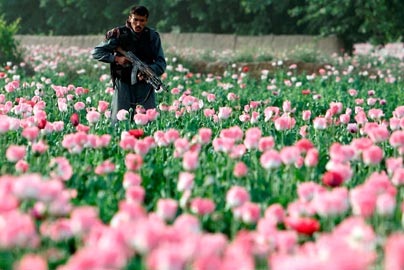By Ray Rivera
KABUL, Afghanistan — Driven by soaring opium prices, farmers are expected to plant poppies at a sharply higher rate in parts of Afghanistan that were previously poppy free, the United Nations said Monday in its annual winter survey of poppy cultivation patterns in this country, the world’s leading opium purveyor.

An Afghan Special Forces policeman walks through an opium poppy field as he searches for Taliban fighters. (Photo: Reuters)
Poppy planting is expected to be down slightly over all because of modest decreases in the southern provinces of Helmand and Kandahar, the country’s most productive opium regions. The provinces continue to produce, but officials expected significant increases in the north and northeast provinces of Badakhshan, Baghlan and Faryab, as well as the southern and western provinces of Herat, Kapisa and Ghor.
Baghlan, Faryab, Kapisa and Ghor were all poppy free in 2010. Sixteen of the country’s 34 provinces are expected to remain poppy free, a decrease from 20 last year. The drop represents what United Nations officials called a disturbing reversal in efforts to reduce opium production, a major revenue source for the Taliban insurgency.
Prices for dry opium jumped 306 percent this year, to $281 a kilogram from $69 last year. It was the second consecutive year of sharp increases, which the report attributed to a blight that destroyed nearly half of last year’s crop.
“Today we have prices never seen before since 2004,” said Jean-Luc Lemahieu, representative in Afghanistan for the United Nations Office of Drugs and Crime. “This is not business as usual. There is no crop that can compete with those prices.”
At the same time, overall cultivation was expected to drop for the second year in a row, despite rising prices, a sign of optimism for counternarcotics officials. Officials will not know the true extent of poppy cultivation until August or September, once an analysis of satellite images is completed, Mr. Lemahieu said.
Government eradication of opium seedlings in the coming weeks and months could lead some provinces where planting had begun to be poppy free by the fall, Mr. Lemahieu said.
Mohammad Ibrahim Azhar, deputy minister of counternarcotics, said 12 police officers had been killed and 44 wounded in eradication efforts since Feb. 23. Five farmers were also killed in Nimroz Province resisting police efforts, he said.
He added that the Taliban had promised many farmers protection as well as cash advances to grow poppies.
The winter assessment found that in addition to high prices, poppy cultivation in the south was also tied to insecurity and a lack of agricultural aid. Ninety percent of villages in the south with poor security are involved in poppy cultivation, the report said.
“When the opportunity rises, the thief leaves the house, and that’s what we’re seeing today,” Mr. Lemahieu said.
In the north, however, 94 percent of farmers surveyed reported good or very good security. “The increase in poppy cultivation even under comparatively good security conditions gives reason for concern,” the United Nations agency said in a statement.
Afghanistan supplies about 90 percent of the world’s opium. Helmand and Kandahar provinces, which together represent more than 70 percent of the country’s poppy cultivation, are expected to see high to very high levels of poppy planting again this year, despite intense attention on the areas by the foreign-led forces here. Still, both areas are expected to see slight to modest decreases in production, in part because of government eradication efforts. Last year, the government eradicated more than 10,000 acres of poppies in Helmand.



